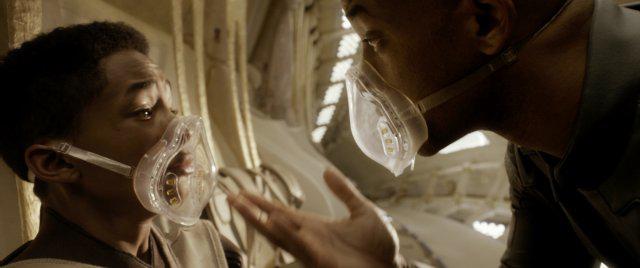After Earth, a sci-fi adventure set 1,000 years into the future, stars Will Smith as General Cypher Raige and Smith’s 14-year-old son Jaden as his son, Kitai. They’re the sole survivors from a ship that crashed on Earth during a space mission. Cypher is left with two broken legs, so it’s up to young Kitai to venture out into the unknown in order to retrieve a special beacon that will signal help from their home planet. Cypher coaches him through the journey via futuristic gadgets.
This is hardly the first time a real-life parent and child have adopted those roles in a Hollywood film, of course. Kirk and Michael Douglas, Jon Voight and Angelina Jolie, Jerry and Ben Stiller, and many others have pulled off the trick. Often, these familial collaborations are a mere gimmick, or a treat for fans. Then there are films where the casting seems intended to lend an added weight to what see on screen. In Wall Street, for example, the scenes between Martin and Charlie Sheen take on an additional dimension from the knowledge that perhaps a real-life father might be warning his son about the temptation of greed.
Even more notable in this regard is Paper Moon, which makes its father-daughter casting central to the film’s story. Director Peter Bogdanovich reportedly sought out Tatum O’Neal for the part of young Addie after a suggestion from his ex-wife and frequent collaborator Polly Platt. Convinced that she was right for the role, he decided to cast her father Ryan, whom he had worked with previously, in the part of Moses, a con man who may be Addie’s father. As Tatum recalled in her autobiography, being cast with her father temporarily “saved” her from an unstable childhood living with her drug-addicted mother. And this echoes Moses’ role as a sort of “savior” for Addie after her mother dies, leaving her an orphan.
And then there’s On Golden Pond, based on a play that Jane Fonda wanted to adapt for film specifically because it reminded her so much of her relationship with her father. “Imagine a woman with a difficult relationship with her father finds a play in which the father and daughter so paralleled real life,” she told the Hollywood Reporter in 2011. “And I was able to buy the rights!” Though they don’t have much screen time together, watching the Fondas re-enact their contentious relationship is fascinating—and was clearly a powerful experience for Fonda herself.
After Earth resembles On Golden Pond and Paper Moon, in a way: Like Chelsea and Addie, Kitai desperately seeks the approval of his father (or, in the case of Addie, her would-be father), and fights to win him over. Cypher spends the majority of the film stoically instructing his son from afar as to how to save their lives—take a special energy valve at this time, run in this direction right now, and so on. And in this heightened life-or-death situation, all of the pressure is placed upon the young teenager alone. “Retrieve the beacon,” Cypher emphasizes to Kitai. “Or we are going to die.”
But while On Golden Pond provided an opportunity for father and daughter to work through real-life emotional difficulties, and Paper Moon was a chance for a talented youngster to spend time with her father, After Earth is plainly presented as a metaphor for a young actor’s career in Hollywood. It’s about “a father having to watch as his son makes mistakes in the world,” Smith has said, frankly acknowledging the film’s professional allegory. But the father doesn’t just watch: He’s heavily involved in his child’s decision-making. And the entire project was conceived as a family project that could make Jaden a star. As Chris Orr explains, the movie was
produced by Smith, his wife, Jada Pinkett Smith, brother-in-law Caleeb Pinkett, and longtime friend and business partner James Lassiter. And it’s based on a story written by Smith as a vehicle for his son, a story that he conceived while he and his brother-in-law were watching television together.
Anyone who’s been paying attention to the Will-Jaden publicity machine that’s been churning for the last month or so knows that After Earth is meant to be the latter’s launching pad into a career they hope will ultimately mirror the former’s in terms of success. (The Jaden-starring remake of The Karate Kid—co-produced by Will and wife Jada, among others—opened at No. 1 and grossed more than $350 million worldwide, but much of that success was probably owed to the familiarity of the property and the cachet of Jaden’s co-star, international box office draw Jackie Chan.) While the elder Smith—together with director M. Night Shyamalan—surely got this project made, the movie is meant to be Jaden’s breakout movie. In a reversal of The Pursuit of Happyness, the father is now the supporting character, with a 14-year-old shouldering the physical and dramatic demands of a potential summer hit.
While Jaden appears eager to follow in his father’s footsteps, he doesn’t seem fully ready. Acting-wise, certainly, he’s got a long way to go. And Jaden doesn’t want to be “just” an actor: He wants to be another Will Smith, a future box-office champion, and transparently so. With a reported budget of $130 million, a release date right in the middle of the summer season, and Will’s box-office legacy looming large, the sci-fi movie is being set up as a blockbuster carried by a novice talent. (It’s Jaden’s name, not Will’s, that is listed first in the closing credits.) This business partnership between father and son thespians feels unlike anything we’ve seen in Hollywood before—and it’s not a pretty sight.
